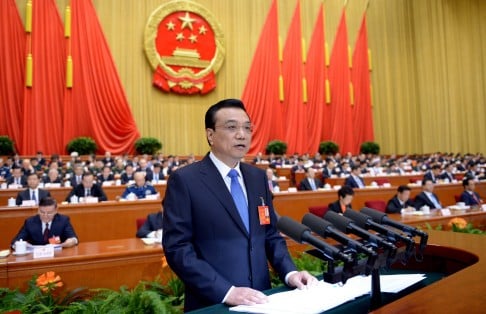It's war on smog! China pledges pollution battle 'for the nation's future'
The central government yesterday declared a "war on pollution" and pledged greater reforms to move the world's second-largest economy towards a more balanced growth model this year.


Li told the national legislature that the country would fight pollution with the same determination it mustered over the past three decades in battling poverty.
"[Pollution is] nature's red-light warning against the model of inefficient and blind development," Li said. "Efforts to protect the environment matter to people's lives and the future of the Chinese nation."
More mainland cities have been increasingly beset by thick, acrid smog, posing health risks, fuelling popular anger over the declining environment and generating criticism of Beijing's economic management. The 32-page work report was one of three key policy documents delivered to the NPC yesterday, along with the annual budget and the National Development and Reform Council's report on social and economic development.
Watch: China's annual meeting of parliament starts amid tight security
The documents represent the policies crafted by the Communist Party in the year since President Xi Jinping took power. The plans are subject to NPC approval, although the body usually makes few changes.
The budget included a 12.2 per cent increase in defence spending, up slightly from the 10 per cent average of recent years.
Li's work report anticipated economic growth of "around 7.5 per cent" this year, unchanged from last year. Similarly unchanged were the central government's targets for inflation (3.5 per cent) and money supply growth (13 per cent).
Many economists have called for the government to tolerate smaller gross domestic product growth to allow a swifter transition from an economy dependent on heavily polluting industries to one with robust hi-tech and service sectors. Li said the GDP target was set after considering the need to "boost market confidence" and "promote economic structural adjustments", as well as "ensure employment".
Li Daokui, a Tsinghua University professor and former central bank adviser, said the growth target "would not be easily achieved" because growth was slowing after hitting a two-decade low of 7.7 per cent last year.
Li Keqiang acknowledged that the country was at a "critical juncture", where it needed to make painful structural changes.
"China's reform had entered … a deep-water zone," Li said. "We must … break mental shackles and break down the barriers of vested interests with great determination."
Li promised sweeping reforms to promote sustainable growth by simplifying administrative approvals for investment, opening state-dominated industries to private investors and encouraging consumer spending.
The government would launch investment projects in the financial, energy, railways and telecoms sectors to allow private investment in industries now dominated by state-owned enterprises, the work report said.
Reforms would include a widening of the yuan trading band. Local government debt, a major concern for investors, would be included in budget reports.
Li said the country aimed to make domestic demand "the main engine driving growth". He promised to raise household incomes, develop e-commerce and encourage the growth of service industries, such as education, tourism and care for the elderly.
The fiscal deficit would reach 1.35 trillion yuan (HK$1.7 trillion) this year, up 150 billion yuan from last year, although the budget gap as a share of the overall economy would not change.
Beijing would help Hong Kong and Macau "energetically develop" their economies and "advance democracy in accordance with the law", Li said.
BEIJING OUTLINES BROAD STRATEGY FOR TACKLING SMOG
The central government will adopt a broad strategy to tackle China's environmental decline, including cutting emissions and relying more on renewable energy, but a green group said the announced measures didn't go far enough.
Premier Li Keqiang said the expansion of smog-affected areas was "nature's red-light warning against inefficient and blind development".
The country would limit coal use, increase its reliance on hydropower, start constructing new nuclear plants and develop deposits of natural gas, coal-bed methane and shale gas, Li told delegates to the National People's Congress, vowing to change "the way energy is consumed and produced".
The government set a target of reducing emissions that pollute the air and water by as much as 5 per cent this year, and cut energy consumption per unit of economic growth by 3.9 per cent.
The nation would also launch a comprehensive clean-water plan and programme to remove contaminates from the soil, Li said.
Although the leadership has stressed the importance of stronger action over pollution, government spending on environmental protection and energy conservation dropped by 9.7 per cent last year, to 180 billion yuan (HK$228 billion), compared with 2012. And only 86 per cent of the budget for last year was used, according to the Ministry of Finance.
Part of the reason less money was spent was due to the central government allowing a subsidy on energy-saving home appliances to expire last year, the ministry said. It called for spending to rise to 210 billion yuan this year.
But Ma Jun, the director of the Beijing-based Institute of Public and Environmental Affairs, said the government's investment fell short of what was needed to address the country's pollution woes.
Speaking on the sidelines of the congress meeting yesterday, Environment Minister Zhou Shengxian said the nation's smog was largely the result of local governments protecting polluting factories, local environment bureaus that did not take action and companies that emitted excessive pollution.
But he said progress was being made. He noted that recent pollution concentrations in the area covering Beijing, Hebei and Tianjin were lower than in January 2013.
"The public cannot feel such change, but it is happening … We need to be patient," he said.

